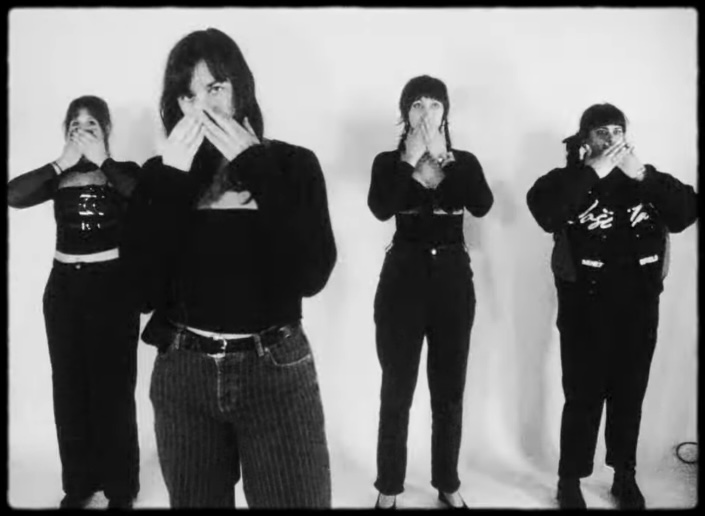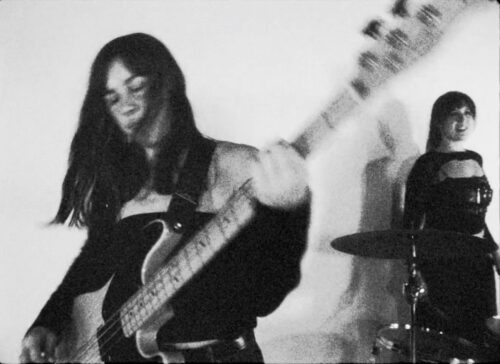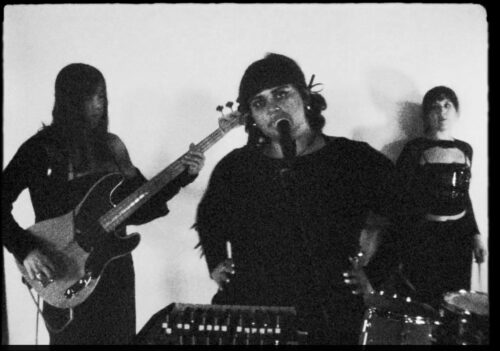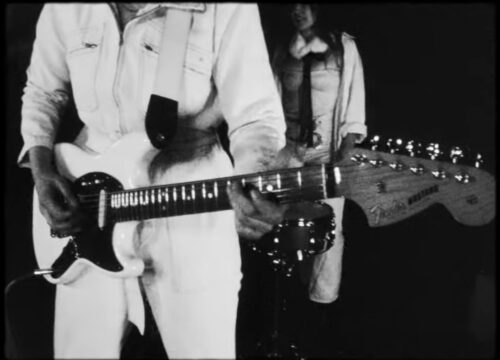
Interview with Philly’s Eraser
Eraser has spent the past couple of years making noise in Philly basements, winning over many a discerning punk with their blend of post-punk and no wave. Now they’re making noise in punk’s critical circles with their debut release, Hideout 12”, brought to you by Philly institution Siltbreeze Records. We sat down with Kat Bean (bass), Pier Harrison (guitar), Sonam Parikh (vocals/synths), and Juliette Rando (drums) to discuss the band, Philly’s punk scene, non-Western musical influences, healing gossip, and their brand new record.
All photos featured are stills from the “Simon Says” video directed by Jacqueline Castel with assistance from Eva Tusquets.
MRR: The first I heard of you all was your excellent track on the also excellent No Occupation: Another Benefit for Mutual Aid in Gaza comp that came out a few months back, but you’ve obviously been around a little longer than that. Can you tell us a little bit about how Eraser came to be?
Pier: Well, Sonam and I were getting together to jam with just synth and guitar. And then we were like “Oh, this is cool, we should get someone to play drums and bass!” We were brainstorming a few people to play drums, and we both simultaneously came up with Juliette—we really liked her drumming and liked her as a person. Then we got together and jammed, and it worked out. Then we basically repeated that process with KB on bass.
MRR: How did you guys meet? Were you just familiar with each other through the scene?
Kat: Yeah, playing shows together. My previous band had played shows with each of their previous bands multiple times like over the years. But you know when you’re on tour and you meet people, you’re like, “Oh, it’s you!” Where you know someone’s face, but you have never really talked.
Pier: I was trying to hang out with KB, but they were always so busy. Something we joke about is that one of the reasons you start a band is to have people to hang out with.
Kat: It’s also cool to just have a structured hang, centered on an activity where there’s a nice thread that everyone can attach to, and a lot of cool stuff comes from that.
Sonam: Yeah, and I’m not being hyperbolic, but the first time the four of us played together, we wrote three songs! Like, we all just started playing at once and a song happened. It was so strange.
Pier: Then it happened two more times.
Kat: Yeah, we were just kind of all on the same page. It was nice.
MRR: So, writing songs is a very collaborative effort, then?
Kat: Yeah, I feel like it’s like everyone truly has an equal part.
MRR: So how long have you each been in Philly? Or are you like lifers?
Sonam: I’ve been here for nine years.
Juliette: Yeah, me too.
Kat: I’ve been here for…fourteen years. Too long?
Pier: Well, I moved here in 2020, so four-and-a-half/five years. But I grew up in the Philly suburbs, so it was sort of like coming home
MRR: Where were you prior to that, and what brought you to Philly?
Sonam: I was in Boston playing in a band, Ursula, that relocated to Philly.
Juliette: I’m from the Boston area, and I moved to the Philly area for undergrad.
Pier: I lived in New York for thirteen years before, and I would play in bands that would come down to Philly, where I always had the most fun ever. I’d also played shows with Ursula while they were in Boston, and I knew they and other Boston bands I knew had moved to Philly. It always seemed like this utopia where you could have a more affordable lifestyle and play music. I would try to convince other people from New York to move down with me, and no one would. So, in 2020, I was like “I’m moving by myself!”
Kat: I’m from Central PA and I moved to Philly in 2007 for college. Then I dropped out two years later because it was the recession, and everyone was like, “Don’t do college—you’ll never be able to pay your student loans back.” Plus, I was going to art school, so I was already screwed, you know? I moved around all over after that. I moved back to Philly in 2011 and joined a band. I didn’t play any instruments at the time, but then learned bass. I’m very grateful for the trust and faith put in me at the time–it changed my life. And then, you know, now we’re here.
Juliette: What about you?
MRR: I grew up in Virginia Beach and High Point, NC, went to college in Greensboro, moved to Western Mass—Northampton—for a few years, made my way to DC, then here to Indianapolis.
Juliette: My parents live in Northampton now!
MRR: Whoa! Really?
Juliette: Yeah, we actually just recorded our 12” in their house.
MRR: That’s incredible. Yeah, there’s actually a weird Northampton/MRR connection these days. In addition to me, Erika and Rachel, who do a lot for the site, spent a bunch of time there. Erika and I somehow lived there at the same time without knowing each other, which is inconceivable considering how teeny the town is. So, yeah—wild!
Sonam: That is very odd.
Juliette: Yeah, it’s nice.
Sonam: Actually, the way that you and Erika were kind of tangential without ever really connecting is sort of the story of Eraser. We’d seen each other around so much, and I would even go as far as to say I’ve had friend crushes on these individuals, but never like said anything.
Juliette: Awww! Glad you said something.
Kat: That’s just how Philly is. It’s so small, and you remember everybody’s faces, but then you actually get to know everyone very slowly.
Pier: Yeah, coming from New York, I always thought it was weird that I would know folks in Philly’s relatively small music community who wouldn’t know each other. Like, you play in a band and you book shows, how do you not know each other? There are just little silos within the scene, I guess.
Sonam: It’s like our number finally got called, and Philly put the four of us together.

MRR: Aside from bringing you all together, what kind of influence would you say that Philly or its punk scene has had on the band?
Sonam: I think more than the bands here, Philadelphia’s environment or the city’s ambiance is one of my hugest inspirations. Everybody in Philadelphia goes so hard. They’re super gritty and weathered—it’s something I really, really respect. And the city’s sturdiness and toughness is what I hope to embody in Eraser. It’s funny, you know, I learned with David Lynch’s passing that Eraserhead was actually inspired by Lynch’s experiences in Philadelphia. And I think Eraser is a great encapsulation of Philly in similar ways.
Kat: Philly’s like a giant rusty old factory looming, constantly creaking and shooting steam, and we’re in that mess like, “Why not?”
Sonam: Or, like, Eraser is a tiny, bright orb breathing deep within that factory trying to provide warmth among all the grayness. I actually wrote a lot of lyrics for Eraser’s songs while driving around or taking a train. There’s just something about being in Philly itself that is really formative for Eraser.
Juliette: I think of Philly’s music scene as being very basement-up. It’s just like, go find a basement and play! It’s so accessible and the energy inspires you to say, “Why not?”
Kat: Or even if you don’t want to play in a band, then why not go to three different shows in one week in three different basements? There’s always so much stuff going on!
Alex: So every year, one of MRR’s contributors, Yoni Kroll, devotes his Year-End Top Ten to shedding light on the Philadelphia scene. It always gives the impression that it’s pretty tight-knit out there. But how would y’all describe the scene and Eraser’s place within it?
Kat: Yeah, I would say it’s pretty tight. There are of course different social circles, but they still manage to overlap. Like, we’ve played cool shows with noise bands but also like ’80s goth band kind of stuff.
Sonam: You know, something that I would like to vouch for in the Philadelphia scene is that no matter what show you’re at, like there’s always gonna be a person you recognize from some basement really ready to help out in any way possible. The people here really care for each other and are very supportive, and that feeds into the art. There are just a lot of beautiful little groups of people who all come together all the time to create joy.
MRR: Do you guys have any favorite Philly bands, either current or otherwise?
Pier: Sweepers.
Sonam: Yeah, Sweepers are great.
MRR: Holy cow—they’re so good, right!?
Sonam: Cry9c is a new band that is really interesting. I also really love Sour Spirit, they are so talented. If I were to ask folks to listen to one band from Philadelphia right now, it would be Sour Spirit.
MRR: So let’s talk about your new record. Can you tell me a little bit about the process of making it? I know you alluded to the fact that a lot of the songs kind of came together organically, almost as soon as you guys got together, but how many of them would you say were fully formed when you showed up to Northampton, versus how much of it came together in the studio?
Kat: All of it was ready.
Pier: Yeah, it was all fully formed.
Kat: We had a bunch of demos for a while. Juliette and I recorded them, then I mixed them.
Sonam: Pier recorded some, too. Actually, everybody but me did some recording.
Pier: Oh, yeah, I forgot about that! I recorded some vocals. We set up a little studio in the shower.
Kat: And then we wrote like one new song after we’d recorded the demos, and we were just like, “This one has to go on the record.”
Pier: I would say the guitar on “Trans Air Force 2” didn’t really make sense to me until I could hear it back and decide what needed to go where. Like, every single time we played the song, I would play a different guitar part, basically improvising throughout the entire song. So every take that we have has different guitar parts on it. In that way, it’s the one song that finished taking shape compositionally in the recording and mixing process.

MRR: Ok, yeah, that’s exactly what I was thinking with my question, so I’m glad that you mentioned it! But also I want to commend you for not just releasing the same version of that song that appeared on the Palestine comp! It drives me crazy when bands put out a 7” and then include both sides with the same exact recording on the LP when it comes out.
Kat: Yeah, that’s no fun!
MRR: So, yeah, I was really glad you re-recorded that track. But also that new recording really highlights the oddness of both the keyboard and the guitar. They’re both so grating in this way that I just absolutely love, and the guitar is sort of doing the same thing as the keyboard to the point it’s difficult to tell which is which at times. And that guitar line—I don’t know how you would know how to play it because it’s just so meandering. The thing that it reminded me most of is…do you know Ricardo Villalobos?
Pier: Nope.
MRR: Haha. He’s like a minimal techno dude from the ’00s, and he did a track called “Ichso” that’s built on a similar eerie, meandering melody (if you can call it that). Anyway, that’s what it reminded me of. …I guess that’s not really a question, just more me saying “Trans Air Force 2” is such a great track!
Pier: I like that you point out that the guitar and keyboard have the same kind of grating-ness, because I feel like a lot of people’s idea of music is that each instrument is supposed to occupy a different space or frequency range, and we’re kind of refusing to do that.
Sonam: We really wanted to highlight the guitar when we were recording the 12” because so much of Eraser is the way Pier plays guitar and improvises stuff on stage.
Pier: But at the same time, it was really important that neither instrument be clearer or louder because that mingling makes this single weird, cool thing.
MRR: So speaking of y’all’s sound, the release copy for the 12” compares you to classic Rough Trade and no wave acts, and I definitely hear that. But I also hear something more melodic. I can’t quite put my finger on it, but it’s somewhere in the minimal post-hardcore realm, like maybe Slant 6 or the Casual Dots.
Sonam: I love those bands!
MRR: But that doesn’t seem quite right either. In any case, what I’m trying to say is: who cares what us critics think!? Who would you all say you sound like, or what are some of your biggest musical influences?
Sonam: Up until the age of fourteen or so, I never listened to a single bit of Western music. I only listened to Indian music, like classical and Bollywood. And I’m sure a lot of that has subconsciously sunk into our stuff, like a lot of my vocals come from that being my first exposure to music. So, yeah, one of my greatest influences is like ’60s and ’70s Bollywood. What’s interesting is that we’re often compared to these bands, probably because of this lack of a foundation in Western rock music, and it will be the first time I’m hearing of them. It’s interesting to have so many people compare us to Kleenex—and I get it— a lot of the time I haven’t listened to most of the bands people say we’re influenced by until the comparison has been made.
MRR: And, of course, as a reviewer, I bear some of the responsibility for that. I always feel bad about describing bands by comparing them to other bands. It’s a little lazy—and I am a little lazy—but I also recognize the reason I’m doing it is to provide somebody else with a potential touchstone to latch onto.
Kat: No, it’s really interesting and helpful because even if we don’t know the band we’re being compared to, I know we’ll all go look it up and learn something new. It’s fun! None of us are elitist pricks!
MRR: But at the same time, I also want to get my comparisons absolutely right. Like, I’ll read some promo copy for a record, and go, “Nope—absolutely not. They don’t sound anything like ____.” And with y’all, what I find interesting is that I’ll come up with my list of comparison points, but none of them feel quite right. So, I’m wondering to what extent those non-Western influences are behind that, considering how little exposure I have to that stuff.
But speaking of my comparison points, my go-to shorthand for weirdo synth stuff is…do you know the movie Liquid Sky?
Sonam: No.
Pier: I love Liquid Sky!
MRR: Anyway, the soundtrack to that movie is really grating, but super compelling synth stuff that reminds me a lot of your music.
Sonam: Let me just say this—I don’t have, like, some list of cool punk to emulate or cover, and I don’t know how to read notes or anything. A lot of what Eraser does is just the result of me reaching around in the dark and going towards sounds that feel good. I think we just fell into punk because that’s the most accessible genre. And that is amazing because now as an adult, I love punk. But, yeah, I don’t have that history or pedigree.
MRR: Yeah, and you clearly don’t need to—what y’all are doing is working well!
Kat: I think it’s important that we were never like, “We want to sound like this.” Or, “What do you want to sound like?” That just muddies the pool. It places too many expectations on something you should just give some space and let develop.
MRR: Even when bands do that kind of cosplay thing well, it’s weird to think about them having a band practice and someone saying, like, “Actually, Television Personalities would have done it like this” or whatever.
Juliette: Yeah, I feel like this is literally just us expressing our feelings through our instruments. It’s such a non-judgmental environment, and I’ve been in bands where I felt like my drumming was being surveilled or something. Eraser has been so freeing—we can all just be wacky and try things.
Pier: I think we’re able to take our playing and songwriting to different places because we’re all giving each other the space to explore.
Kat: Yeah, I played power pop for a long time, so it’s nice to get the opportunity to hit it from a different angle.
Sonam: Yeah, in our basement it’s like total freak hours! We all come from different musical backgrounds and have such different preferences.
Pier: When Sonam and I first started playing, I had been used to playing with a certain combination of pedals and gear that produced a certain tone that just didn’t sound right with Sonam’s synths. So, I feel like I ended up kind of crafting my playing and my tone around that. So, my honest answer for my musical influence is just Sonam’s playing.
Kat: And my biggest influence is everybody else.

MRR: So now that your record is done and out, how are you feeling? Is it freeing, kind of like a skin you’ve shed, or is it more like a child that you’re ready to show the world?
Sonam: Definitely a skin we’ve shed!
Kat: Yeah, we’re already like three-quarters of the way to our next record.
Juliette: Yeah, I feel like we all just want to get back to writing music, and it’s kind of like all this is getting in the way of that.
Sonam: If Hideout is us shedding our skin, our next album will be us rubbing ourselves raw.
MRR: So even if you are ready to move on, what do you hope people will get from your record? And what would be your preferred way for people to experience it? Like, would you rather people own it physically and listen to the whole thing, or are you happy for anyone hearing/enjoying any part of it? I guess the extreme there would be like a snippet of a song going viral on TikTok.
Sonam: My preference would just be that people find us via whatever their preferred style of finding music. Like, I know there’s some internet-ass freak who’s going to find us through Bandcamp, and I also know that there’s going to be somebody who’s randomly going to walk into a show of ours and say, “What is this?” I love all the ways there are of finding music, and, like, that leads into my answer to your other question: I hope people look at freaks like us and think, “Oh, I can do this.” Like, when I was growing up, playing rock music was forbidden, and I felt that I had no creative outlets, so I would love for people from South Asia to look at me and see that it is possible to do these things.
Kat: My secret wish is that one of our songs get featured in a skate video.
MRR: Wow! Both fantastic answers! Are you planning to tour the 12”?
Kat: Yeah, we’re planning something for mid-June into late-July, but we can’t reveal anything about it just yet.
MRR: So just out of curiosity, what do you do when you’re not playing music? Like for fun or just to keep sane.
Sonam: Really, I play music. If it’s not with Eraser, it’s with other people.
Kat: Fishing! I also just like nature—I’m like a nature ho, I guess.
Pier: I’m always working, otherwise I’m cuddling my cat. And I love movies. I just worked on this movie Fucktoys that premiered at SXSW, which is…sorry, I’m really happy and proud of the movie and that it’s playing at SXSW, but hearing “SXSW” come out of my mouth—ugh!
MRR: That’s understandable.
Pier: You know what I mean. But, yeah, I worked on the soundtrack for that and it was really fun.
Kat: Juliette is always doing homework, but I feel like she has the most fun out of all of us.
Juliette: I have fun doing homework!
MRR: Homework?
Juliette: I’m in school for data science part-time. But I also like to dance and go on runs.
MRR: Now, I don’t know if you’re aware, but drama in punk is back! And as a hater, I’m here to encourage it. Do you guys have any shit that you want to talk about the current state of punk or really anything?
Sonam: Well, a lot of us are ex-New Yorkers, so you know we could! But, no, we want to stay off the gossip train. Actually, we try to only have healing gossip, which is like passing on things that are positive and affirming.
MRR: Well…that’s a shame! Anything else you want to let the world know?
Pier: Yeah. Just because everyone in your town or social circle plays the same type of music, doesn’t mean you have to make it, too. There was a time where I felt like I was surrounded by indie rock, country bands, and singer-songwriter stuff, and it seemed so crazy to me. Like, I didn’t know this many people could be into this kind of music. So, I’m happy that I was able to take a side-step and find people making other kinds of music.
MRR: How would you recommend that people find those types of music?
Pier: If you can’t find it, you just have to start playing it.
Juliette: Oh, that reminds me of a really cute anecdote I wanted to share earlier. We played a show in Wilkes-Barre, PA, and some young college students came up to Pier afterward and were like, “What kind of music were you playing?” They had just never heard punk before.
Kat: Oh, yeah, they were dressed like towny goths. And the most underground band that they’d heard of was Operation Ivy, so they were like, “Wait…what are you playing? This is punk as well?”
Pier: Oh, right! So, what happened?
Juliette: It was so sweet. You just gave them lists of recommendations and you guys talked for a half-hour. It was really nice.
Again, Eraser’s Hideout 12” is available now via Siltbreeze.
